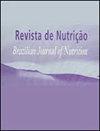Weight bias among dietitians: does the weight status of the patients change the dietary approaches?
IF 0.5
4区 医学
Q4 NUTRITION & DIETETICS
Revista De Nutricao-brazilian Journal of Nutrition
Pub Date : 2022-01-01
DOI:10.1590/1678-9865202235e210214
引用次数: 0
Abstract
ABSTRACT Objective Since obesity is a multifactorial disease, some health professionals may esteem that weight control is a matter of personal willpower and stigmatize individuals. These weight-based attitudes seem quite common even among dietitians. This study aimed to determine whether the level of weight bias affects the dietary approaches of the dietitians. Methods Two hypothetical cases with obese and normal weight vignettes were created to be evaluated, and the explicit weight bias was assessed by the fat phobia scale among 99 dietitians via an online questionnaire. Results The majority of the dietitians demonstrated mild or moderate levels of weight bias (59.6% and 32.3%, respectively). The obese vignette had the highest agreement for nearly all adjectives and was perceived as having poorer diet quality, general health status, and insufficient physical activity level. Conclusion Overall, as weight bias is a concerning issue among most dietitians, necessary steps are required for the reduction of prejudice and thus protect the patients from stigmatizing attitudes.营养师的体重偏差:患者的体重状况会改变饮食方法吗?
【摘要】目的由于肥胖是一种多因素疾病,一些卫生专业人员可能认为控制体重是个人意志力的问题,并对个体进行污名化。即使在营养师中,这种以体重为基础的态度似乎也很普遍。这项研究旨在确定体重偏差的程度是否会影响营养师的饮食方法。方法采用在线问卷调查的方式,对99名营养师进行肥胖恐惧症量表评估显性体重偏倚。结果大多数营养师表现出轻度或中度的体重偏倚(分别为59.6%和32.3%)。肥胖小插图对几乎所有形容词的一致性最高,被认为饮食质量较差,一般健康状况较差,体育活动水平不足。总的来说,由于体重偏见是大多数营养师关注的问题,因此需要采取必要的措施来减少偏见,从而保护患者免受污名化的态度。
本文章由计算机程序翻译,如有差异,请以英文原文为准。
求助全文
约1分钟内获得全文
求助全文
来源期刊
CiteScore
1.20
自引率
12.50%
发文量
24
审稿时长
6-12 weeks
期刊介绍:
Revista de Nutrição is former Revista de Nutrição da Puccamp, founded in 1988. It is a bimonthly publication every four months and it is of responsibility of the Centro de Ciências da Vida, da Pontifícia Universidade Católica de Campinas . It publishes articles that contribute to the study of Nutrition in its many sub-areas and interfaces; and is open to contributions of the national and international scientific communities.

 求助内容:
求助内容: 应助结果提醒方式:
应助结果提醒方式:


